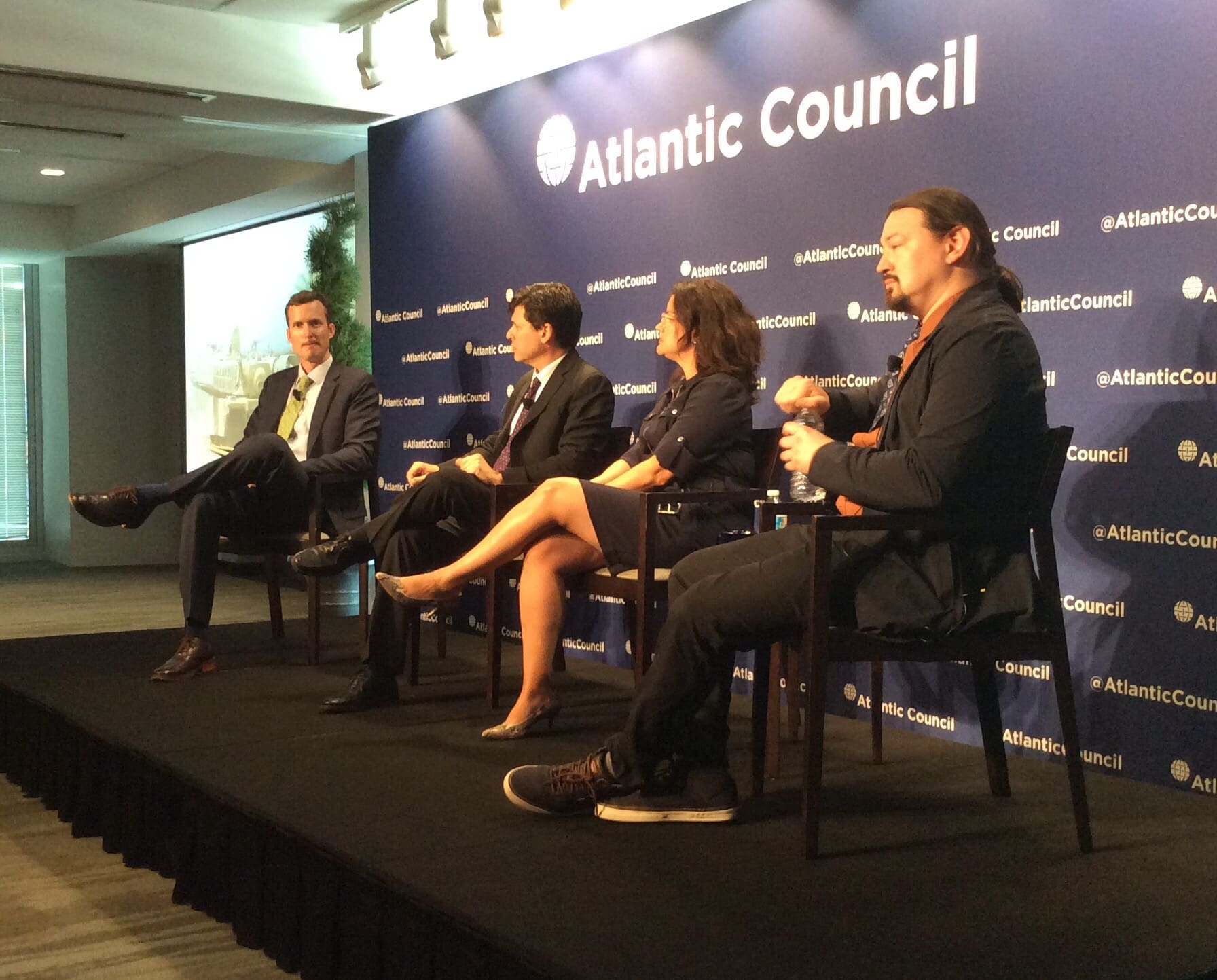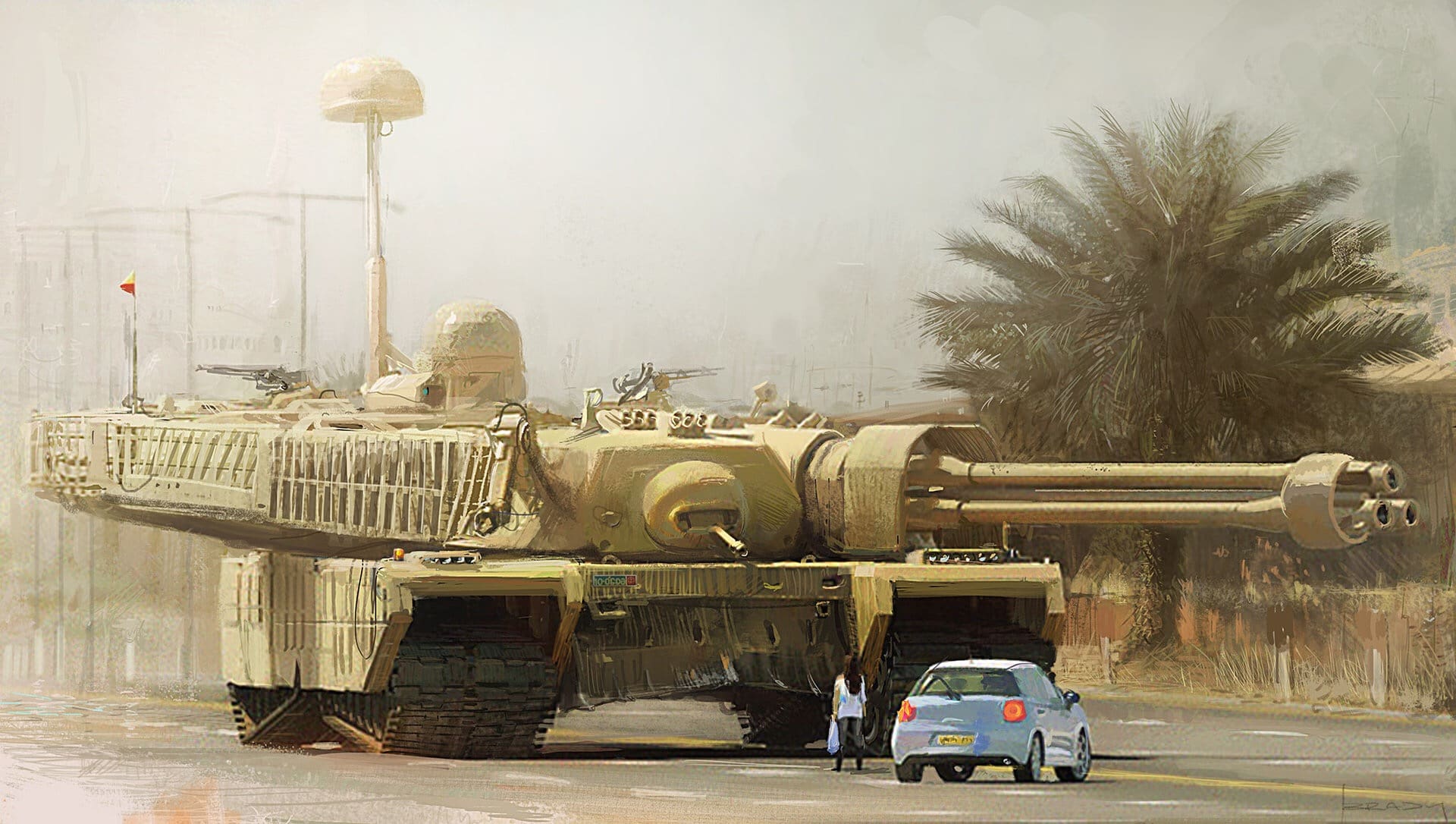Awhile back I mentioned the upcoming Envisioning The Future of Urban Warfare panel presented by the Atlantic Council in Washington, DC. This is the fourth in a series of “The Art Of Future Warfare”. The Atlantic Council is dedicated to bringing new voices and ideas to the national security arena. It holds numerous symposiums throughout the year and publishes various studies.
Somehow the comments in the post where I mentioned this event went sideways with readers concerned that this was some group of whacko artists hell bent to leverage a visit to America’s foreign battlefields in order to get a glimpse of realism in order to make their more realistic. The truth of the matter is the opposite. We need them. Sessions like this are used by think tanks to leverage the imagination of artists and help develop a “concept of the possible” regarding future operational environments. The idea is to envision what the environment might look like, but also how our adversaries might fight. Their creativity was put to work to illuminate novel concepts and disruptive technologies in the 2040-2050 timeframe.

The “Envisioning The Future of Urban Warfare” session consisted of three panelists guided by August Cole, Director, Art of Future Warfare Project at the Brent Scowcroft Center on International Security, Atlantic Council. Two panelsists are artists in their own right and the third, an intelligence analyst amd advisor to the US government. All focused their efforts to offer some insight into future operating environments.
Max Brooks
Author Max Brooks is well known to many. His focus has been on Urban Chaos and comes to prominence in his works, World War Z and Extinction Parade.
He offered these insights:
-We are the world’s first isolationist superpower. Brooks said he is convinced that the war of 2050 has already stated. It isn’t a conflict yet, it’s an environmental dispute, a border issue, a tribal turf war. About 2030, the war starts, and in 2050, we are drawn in. This goes back to his point that we are a reluctant superpower and leery about wading in.
-America is very good at reinventing itself. We adapt as a nation, in fairly short periods of time. As an example he explained that the Army that went into World War Two was quite different than the Army that emerged triumphant in 1945.
-Multiculturalism is our strength. No matter where we go in the world, we have diaspora living here who can bridge across cultures and we have mega cities that are similar to those we will see in the future. He did however, add one comment about those megacities that struck me as flippant, “Thanks to the gun lobby, they are armed to the teeth.”
-As a medium, Brooks mentioned that he needs science fiction to be able to educate. He went on to said that in order to look forward, we need to look back. In WWZ, he did exactly that. Take the Battle of Yonkers vignette for instance. It’s based on history. He also suggests we look sideways for other, similar situations.
One thing impressed me. Max Brooks has been studying. He understands the concept of the elements of national power, or DIME (Diplomatic, Information, Military, Economic). Even our federal government, outside of the military seems oblivious to the concept that we wage conflict as a nation and not just via force of arms.
Brooks also gave some good advice, “Always try to feel like a seventh grader, the dumbest person in the room. Then you’re learning.”
Interestingly, Max Brooks related that he is dyslexic and didn’t pick up his first book until he was 16 when he read “Hunt for Red October”. Tom Clancy was very influential. He was not only entertained by the book but also educated and this helps you understand how he uses science fiction to inform as well as entertain.
Jon Chang
Many of you know Jon Chang for his work on the “Black Powder, Red Earth” video games and graphic novels. He also works for Haley Strategic Partners.
Chang sees art as an expression of data. BPRE was written based on study, but of experience, more than of raw data. He had access to several people with extensive experience in Iraq that helped him understand the environmemt.
Based on what he has learned studying modern conflict, Chang made a couple of observations.
-Tools may change but the techniques don’t.
-There are no shortcuts.
-People are always in conflict. It’s about managing that conflict to make it unpalatable enough that they don’t escalate.
Chang also sees future conflict very much a function of corporate, rather than national interests. He believes that corporations will work engagement angles like funding NGOs in order to build goodwill.
When asked what art form influenced him growing up, Chang mentioned Manga.
Dr Erin M Simpson
Dr Erin Simpson is the President and CEO of Caerus Associates. She isn’t the typical artist. Her training is in Political Science but has a great deal of experience in using statistics and other data to support analysis. Most recently, she has examined cities as systems, making her contribution to this panel most excellent, in my opinion.
Dr Simpson’s observations:
-Her recent work on a Mega cities project led her to conclude that cities are not an engineering problem, but rather a systems problem. She sees an explosion of connectivity and a move to instrument cities which has led to an ubiquitousness of sensors. As far as analysis of the urban environment goes, Dr Simpson advises to look at how a city behaves as a system and remove the emotion from the equation.
-She’d like to see a narrative piece added to intelligence analysis. Most information is presented as raw data and a narrative agent might be used to create a story from the data. Furthermore, a storybook tool could be used for predictive analysis to see how outcomes might change as different data is fed into the system.
-Her work is driven by human and organizational behavior. She considers who has power but doesn’t stop there, wanting to determine the source of that power. Take, for instance, access to water. Is it just access, or is it something else like having control of the village with the engineers that manage the water system?
-Nature abhors a vacuum. Even though a state doesn’t have control of an area, someone does.
-Regarding expeditionary operations, she says that we won’t bring everything with us anymore and will rely on host nation services.
Dr Simpson was very careful to differentiate urban operations vice urban warfare since there is such a wide mission set that may be accomplished in urban areas.
I found this comment regatding US intervention abroad most enlightening, “It’s the santa clause problem, the State department is not coming.”
She is fascinated by discovery. It’s not about collecting info once you know what the problem is, but rather, the real issue is identifying the problem itself. For example, having a hunch that there is an international Islamic terrorist network. The hard work is in the proving it. The book, “Band Played On” that chronicals the discovery if the AIDS virus is about that; “There’s a disease killing people. What is it?” She also mentioned Neal Stephenson’s “Snow Crash” as particularly influential.
Alex Brady
Artist Alex Brady Winner of the War-Art challenge contest. It was obviously inspired by the events of 1999 in Tiannemen Square. I’m curious though, what does it say to you?















































































































